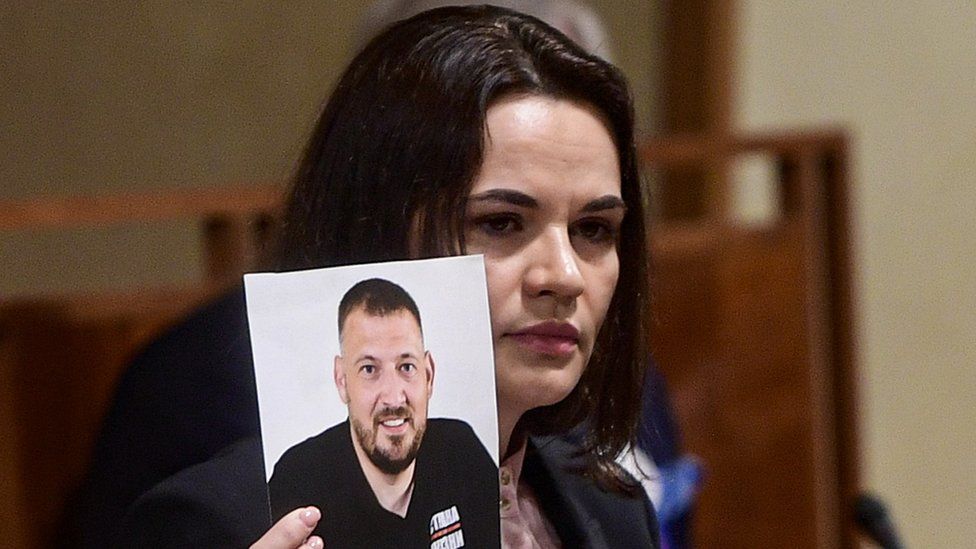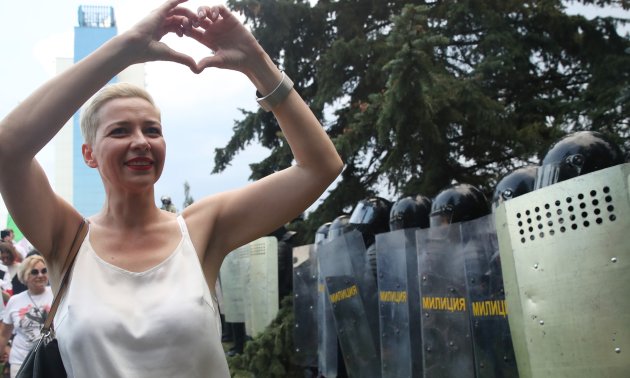Vienna, November 23, 2021 (NEW Reporting against all the odds in Belarus and fear of Putin re-invading Ukraine in December, 26/11/21, BBC report 29/11/21 on refugees flown back to Iraq from Belarus. 29/11/21 Chaotic scenes on Polish border.
by Edward Steen, Sec-Gen
Vienna yesterday hosted a predictably difficult meeting to discuss Belarus and “President” Alxander Lukashenko’s grotesque, cruel, and concocted refugee crisis on the border with Poland.
So far, the only heroes of this imbroglio have been Polish peasants who sheltered families that managed to cross the border and were hidden from the Polish authorities intent on forcing them back into a freezing no man’s land.

Today, Christian Ultsch, foreign editor of the Austrian daily Die Presse (DE) published a detailed account of what happened at the meeting, and of the prize-giving for the three women exiled leaders.
It was a long day in Vienna for the Belarusian opposition leaders, Maria Kolesnikova, Svetlana Tikhanovskaya, and Veronika Tsepkalo: with appearances, speeches, and debates at the international Belarus conference, with interviews, a press conference, and lots of talks.

In the evening, the two women came to the Vienna editorial office of the Kleine Zeitung still admirably fresh to receive the Fritz Csoklich Democracy Award of the Styria publishing house. They received the 10,000 € award for their courageous fight against Alexander Lukashenko, the dictator from Minsk.
The third of the group, Maria Kolesnikova, could not be there. She is in solitary confinement in Belarus. The acceptance speeches by Tikhanovskaya and Zepkalo were brief, forceful and modest: both emphasised that the honour was not for them personally, but for all their compatriots who fearlessly fight for freedom, democracy and the rule of law in Belarus.
It was a short ceremony in a small setting. A ceremony had been planned at the Diplomatic Academy – with guests, a laudation, and a public interview. But the event was cancelled due to the lockdown. And so it remained with a modest ceremony under strict Corona rules at the Kleine on Lobkowitz-Platz – with a few words from Doris Helmberger-Fleckl, Hubert Patterer and Rainer Nowak, the chief trio of Furche, Kleine Zeitung, and Presse.
They remarked how absurd and embarrassing they found the far-fetched dictatorship comparisons after the imposition of the current lockdown in Austria, where two women were now standing next to them who had experienced first-hand what a dictatorship meant.
For Tikhanovskaya and Zepkalo, these two inspiring idealists, it is a very personal struggle for which they have put everything on the line. They stood in for their husbands, who had been arrested and/or eliminated from the electoral list, in the presidential campaign against Lukashenko in August 2020.

Tikhanovskaya’s husband Sergei is in solitary confinement in Belarus after what she termed a “show trial”. She lives in exile in Lithuania with her two children and leads the opposition from there. Veronika and Valeri Zepkalo, a former ambassador and founder of a high-tech park, have moved to Athens with their eight-year-old twins; she works for Microsoft there, he is looking for a job. Money has become scarce.
Veronika Zepkalo was grateful and angry at the same time that evening. She had been invited to the virtual Belarus conference. For the Austrian organisers had not sent her and her husband a link for the opening part of the event, for the exchange of views with Chancellor Alexander Schallenberg, EU Enlargement Commissioner Olivér Várhelyi, the foreign ministers of Germany, Poland, Estonia Slovenia, Finland and Slovakia, as well as the deputy foreign ministers of Lithuania and the Czech Republic and the US special envoy Julie Fisher.
Only Tikhanovskaya was admitted to the Internet room with the big guys. The Zepkalos were only admitted to the afternoon panels, which dealt with reforms and the reconstruction of Belarus. This still annoyed Veronika Zepkalo in the evening. Despite all the opposition’s unity in the fight against Lukashenko, rivalry and a hint of jealousy flashed through.
Veronika Zepkalo struggles a little with the fact that she and her husband have to pay for everything out of their own pockets, while Tikhanovskaya has an office and security guards in Vilnius. But Tikhanovskaya is president of the so-called Coordination Council of Belarus and thus a figurehead. When Zepkalo approaches governments or the EU Commission, she is often told that they are already in contact with Tikhanovskaya.
Bounty money for arrest of Lukashenko
The Zepkalos take a somewhat harder line than other oppositionists. They have not only brought a case before the International Criminal Court in The Hague to prosecute Lukashenko for crimes against humanity. They have also offered a bounty for his arrest. In this way they want to create and deepen rifts in the dictator’s environment. A long-term project.
Veronika Zepkalo struggles a little with the fact that she and her husband have to pay for everything out of their own pockets, while Tikhanovskaya has an office and security guards in Vilnius. But Tikhanovskaya is president of the so-called Coordination Council of Belarus and thus a figurehead. When Zepkalo approaches governments or the EU Commission, she is often told that they are already in contact with Tikhanovskaya. The Zepkalos take a somewhat harder line than other oppositionists.
They have not only brought a case before the International Criminal Court in The Hague to prosecute Lukashenko for crimes against humanity. They have also offered a bounty for his arrest. In this way they want to create and deepen rifts in the dictator’s environment. It’s a long-term project.
The Belarusian opposition is now quite scattered and fragmented – from Warsaw to Vilnius to Athens. In Belarus itself, it has gone underground. After 14,000 arrests, almost no one who values his or her life dares to demonstrate openly on the streets anymore. Lukashenko has succeeded in putting down the mass protests and sitting them out.

Even the sanctions imposed by the West have not brought him to his knees. The EU has already put together four sanctions packages, a fifth is in the works, and 166 people and 15 organisations are subject to penalties such as entry bans or financial blockades. Lukashenko remains firmly in the saddle.
Most recently, his staged immigration crisis at the EU’s external border was his way of getting back into the conversation. This has been going on for decades. Lukashenko has his opponents imprisoned around elections, and after a while he releases some of them if the EU gives him political or economic advantages in return.
Europe played along for a long time – hoping to pull Belarus into the Western orbit. But for Lukashenko, the seesaw policy was always just a means of creating a balance and not having to completely hand himself over to the big Russian brother in the East. That game is now over. Lukashenko has taken the confrontation with the EU too far. After the mass protests and mass arrests, Europe can no longer overlook the repression in Belarus, all the more so after the hijacking of the Ryanair plane in the spring and the cynical instrumentalisation of migrants at the border with Poland.
Lukashenko is now completely dependent on Vladimir Putin. The EU has set its sights on taking him on, but is somewhat at a loss. The sanctions have not brought about any change in Lukashenko’s behaviour.
Best intentions? Or cloth ears?

The original aim of the international Belarus conference in Vienna was to bring representatives of the regime and the opposition to the same table. Alexander Schallenberg, then still Foreign Minister, sent an emissary to Minsk. And he also talked about it on the fringes of the UN General Assembly with the Belarusian chief diplomat, Vladimir Makei. But his pleas fell on deaf ears.
A few days ago, at a joint appearance with his Russian counterpart, Sergei Lavrov, Makei described the Belarus conference in Vienna as a senseless, hostile act and, on top of that, blabbed about his secret meeting with Schallenberg in New York .
The Austrian diplomats are convinced that the path to a political solution must ultimately be through dialogue. Tikhanovskaya, too, wants to talk to representatives of the regime about holding new elections after all political prisoners have been released. She herself, she affirmed in an interview with the Presse am Sonntag and the Kleine Zeitung, would not even be a candidate.
However, Tikhanovskaya rejects talks with Lukashenko. And she also strongly advises the EU against it, as she confirmed at the Belarus conference. For her, Lukashenko is not a legitimate president because of the election manipulations and the repressions before and after.
She and Zepkalo found it all the more annoying that the German Chancellor, Angela Merkel, recently spoke to Lukashenko on the phone about the migration crisis. But Merkel’s aim was to defuse the humanitarian emergency for migrants on the border with Poland, Tikhanovskaya conceded in Vienna.
Austria plays a special role in Belarus. To a certain extent, it is a role model as a neutral state – and an economic player: Raiffeisen, A1 and other companies are active in Lukashenko’s little empire. So Austria tends to put the brakes on economic sanctions. At the same time, Vienna is persistently engaged diplomatically for a democratic and free Belarus.
For months, seminars have been held in Vienna, away from the public eye, in which opposition members debate a future constitution for Belarus. Last Saturday, another such meeting took place, and the Zepkalos were there.
Plans that went awry from the start
The Belarus conference in Vienna was the brainchild of Tikhanovskaya. Not everything went according to plan, in fact almost nothing.
Representatives of the regime were reluctant to come. And then the lockdown intervened and the whole event migrated to the Internet. Actually, the plan was to invite at least members of think tanks close to the regime in Moscow or Minsk. But that also fell through.

The Austrians didn’t want to send links in that direction. What remains of the event? The fragmented opposition had the opportunity to exchange views on a platform, albeit only virtually. And the high-ranking Western participants showed solidarity with the democracy movement.
For Tikhanovskaya and Zepkalo, it is important that the world does not forget the oppression in Belarus. That is why they patiently cultivate contacts with the media and seek publicity, although this may not actually be what they really want. They were genuinely happy about the Csoklich Democracy Prize, about the recognition and attention. It wasn’t an act, you could feel it.
“At the risk of their health and their lives, the democracy movement and its supporters are fighting for the removal of dictator Alexander Lukashenko”, the jury’s statement awarding the prize. “This movement and this courage are very much in line with Fritz Csoklich’s guiding principle of taking freedom at its word, as well as his commitment to the democracy movement in Eastern Europe even before the fall of the Iron Curtain.”
(NEW Reporting against all the odds in Belarus and urgent fear of Putin re-invading Ukraine in December, 25/11/21) Chaos on border (BBC)
♦ Washington Post 26/11 Will Putin use cover of Belarus crisis to re-invade Ukraine in next days?
♦ Online discussion of journalism in Belarus “against all the odds”
♦ Anne Applebaum on how the bad guys are winning
♦ Lukashenko’s blustering BBC interview

